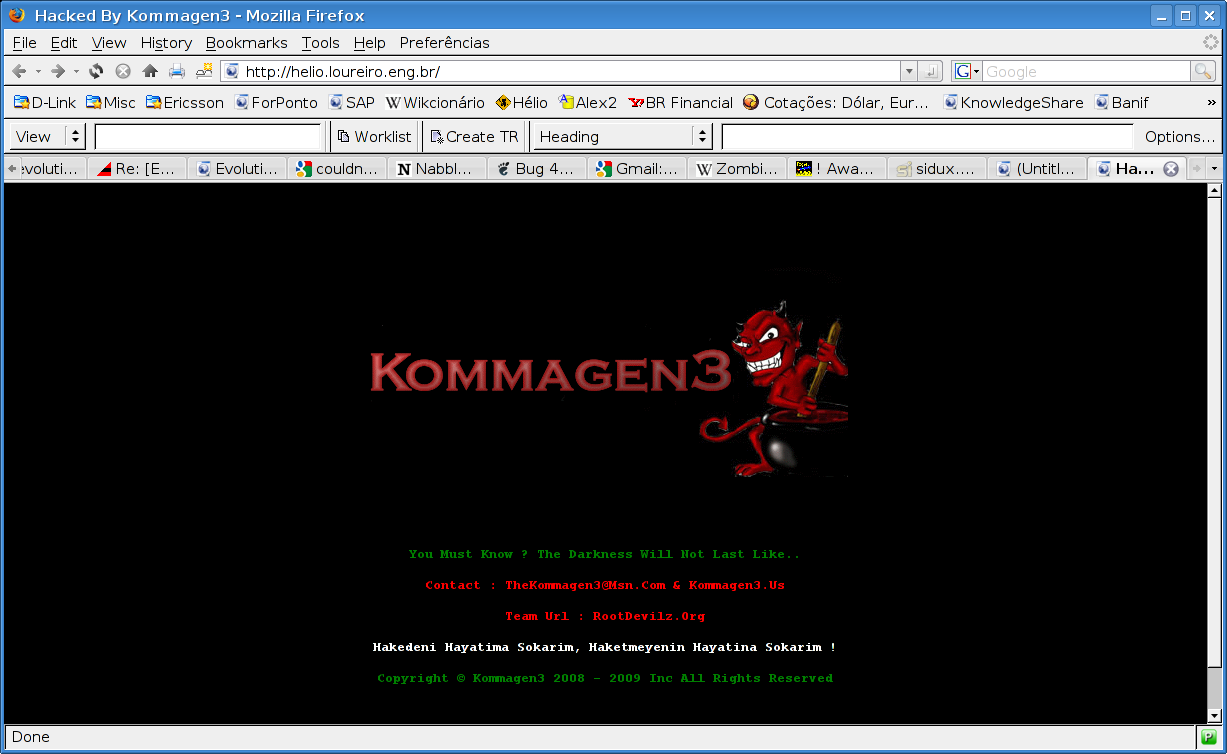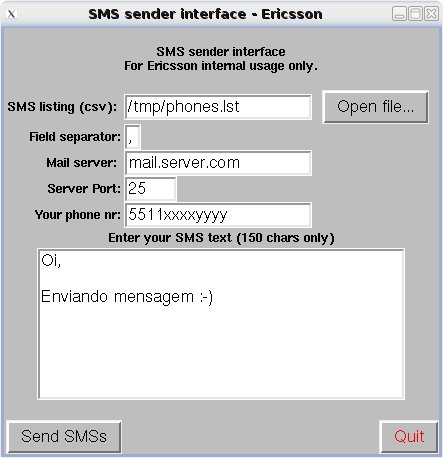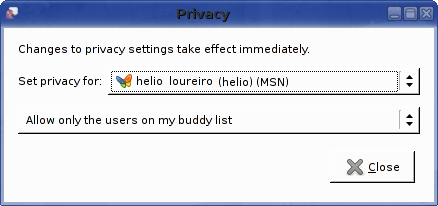 A alegria do homem é realmente fugaz. Só o fato de olhar meu site e ver que não foi hackeado (SIC) novamente já me deixa feliz.
A alegria do homem é realmente fugaz. Só o fato de olhar meu site e ver que não foi hackeado (SIC) novamente já me deixa feliz.
Assistindo alguns vídeos de umas palestras, encontrei por acaso o vídeo abaixo. Desconsiderando o título (BSD está morrendo), é uma palestra muito legal e engraçada. Infelizmente totalmente em inglês e sem legendas. Mas não se acanhe: eu também não entendi boa parte do que foi dito! Mas dá pra acompanhar bem a idéia pelos slides.
 Nunca postei sobre o assunto aqui, mas já faz algum tempo que tenho estudado investimentos em bolsa de valores. Ou trading, como também é conhecido.
Nunca postei sobre o assunto aqui, mas já faz algum tempo que tenho estudado investimentos em bolsa de valores. Ou trading, como também é conhecido.
Com o carrossel dos mercados atualmente, alguns devem achar loucura investir em algo como ações. Realmente é. E exige estudo, paciência e disciplina. Essa última a mais difícil para mim (e a grande maioria dos investidores). E tenho gostado de estar investindo em bolsa mais pela parte do esforço intelectual que pelos ganhos recebidos, tanto que até agora não recebi nada que vale-se o tempo dedicado. Mas é um bom hobbie intelectual.
Como fiel usuário de Linux/FreeBSD e outras alternativas não-windows, é difícil encontrar um aplicativo bom para análise de mercado. Na mundo Windows, existe o "MetaStock". Realmente um software profissional, mas totalmente pra Windows (sem versões em Java). Existem alguns relatos de sucesso utilizando o MetaStock através do Wine, mas isso está longe de ser o que eu busco: um software nativo para Linux/FreeBSD.
Estava então utilizando o Aiotrade , um software escrito em Java. Atende muito das necessidades de um trader, como buscar as informações dos valores de ações via Yahoo (onde é possível buscar os índices do Bovespa), gráficos diário, semanal e mensal, indicadores como bandas de Bollinger, SAR, média, etc. Infelizmente alguns gráficos não são legíveis e o uso de Java acaba com toda a memória do sistema depois de algum tempo de uso. Fora isso, seu desenvolvimento parou em 2006.
Dando uma procurada na Internet nesse fim de semana, encontrei um Blog interessante:
 Além das ferramentas que já conhecia, algumas em modo texto (Venice) ou quase isso, encontrei algumas novas. A que mais chamou minha atenção foi o Itrade.
Além das ferramentas que já conhecia, algumas em modo texto (Venice) ou quase isso, encontrei algumas novas. A que mais chamou minha atenção foi o Itrade.
Itrade é um programa escrito em Python, utilizando wxPython (ou wxWindows) para melhorar o visual da interface. Enquanto o Aiotrade está fora do meu alcançe para melhorar ou manter, o Itrade já acena com mais simpatia. No momento baixei os fontes (ou executável, uma vez que é escrito em Python) e estou brigando pra fazer funcionar:
helio@musashi:itrade$ python itrade.py
iTrade(alpha) - 0.4.6
Nausicaa2 - (official) (r836)
Psyco is not running (library not found)
User Configuration : usrdata/usrconfig.txt
XLRD package (http://www.lexicon.net/sjmachin/xlrd.htm) not installed.
wxPython Selected : 2.8-gtk2-unicode
/usr/local/lib/python2.5/site-packages/wx-2.8-gtk2-unicode/wx/_core.py:14240:
UserWarning: wxPython/wxWidgets release number mismatch warnings.warn("wxPython/wxWidgets release number mismatch")
Traceback (most recent call last):
File "itrade.py", line 221, in main() File "itrade.py", line 202, in main import itrade_wxmain
File "/tmp/itrade/itrade_wxmain.py", line 57, in from itrade_wxbook import iTradeMainWindow
File "/tmp/itrade/itrade_wxbook.py", line 59, in from itrade_wxquote import open_
iTradeQuote,addInMatrix_iTradeQuote,removeFromMatrix_iTradeQuote
File "/tmp/itrade/itrade_wxquote.py", line 63, in
from myfinance import candlestick, plot_day_summary2, candlestick2, index_bar, volume_overlay2, plot_day_summary3
File "/usr/local/lib/python2.5/site-packages/wxaddons/__init__.py", line 180, in import_hook return
builtin_import(name, globals, locals, fromlist)
File "/tmp/itrade/myfinance.py", line 24, in from matplotlib.transforms import Value, zero, one, \
ImportError: cannot import name Value
Infelizmente descobri que uma das dependências, Matplotlib, teve uma atualização de API, o que está fazendo gerar o erro acima. Estou vendo o que é possível fazer, mas mesmo assim esse projeto mostra-se como promissor. E com as frequentes quedas da bolsa, acho que os problemas de biblioteca e dependências não afetarão minha performance tanto assim.
Vírus, spammers, cavalos de tróia, etc. Os caminhos da Internet são cheios de bestas mitológicas, tão devastadores quanto os das epopéias gregas. Arrasando tudo a sua frente, sem dó, sem misericórdia.
E finalmente chegou meu dia de saborear tal destino. Conseguiram invadir esse site e fazer um "defacement", ou em bom português, desfigurar o site.

Como já dizia o dito popular: "em casa de ferreiro, o espeto é de pau". O site é baseado no CMS Mambo Server, de onde o Joomla surgiu. Como uso o Mambo desde 2005 (o primeiro post tem data de "Apr 27, 2005 at 12:06 PM"), por sugestão do meu caro amigo Eduardo Maçan que também o utilizava na época, nunca me incomodei em atualizar muito ou migrar pra outra plataforma. Comecei com a versão 4.5.0, mas tinha atualizado para 4.5.1, quando fiz a "cara" verdinha do site. A mudança foi justamente por motivo de segurança.
E agora, finalmente, fui atacado com sucesso. O ataque foi através do uso de um script chamado Fx29PHPBot. Não achei muita informação sobre o mesmo, mas deve estar baseado em algum sql injection ou coisa do tipo. Isso deixou alguns arquivos extras no servidor:
fx29id2.txt fx29bot.txt fx.php
além do próprio index.php, que foi sobrescrito.
Como o sistema é hospedado e não tenho acesso aos logs... só me restou buscar um backup do site, e carregar em read-only, até descobrir como o ataque ocorreu e, o mais importante, como impedir. Agora posso voltar a postar, utilizando a última versão do Mambo server, 4.6.2. O upgrade foi meio traumático, mas aparentemente com sucesso.
Na minha última viagem ao exterior, mais de 1 ano atrás, bem antes de qualquer palavra parecida com "crise" surgir na mídia, adquiri um Wireless router WGR614 v7 da Netgear.
Funciona a contento, como a grande maioria dos produtos desse tipo, mas tem um grande ponto negativo: a falta de interfaces telnet e snmp para comandos e monitoramento.
Como precisava ter uma idéia do meu tráfego de rede, resolvi fazer um script para ser usando com o MRTG. Escrito em perl, precisa do navegador via texto "lynx" para buscar os dados:
|
O programa, chamado "WGR614v7_traffic.pl", exige como argumento as opções WAN, LAN ou WLAN.
Para o MRTG, adicione uma entrada como:
Target[wan]: `/home/helio/bin/WGR614v7_traffic.pl WAN`
MaxBytes[wan]: 1000000
Title[wan]: WAN packets traffic at WGR614v7
PageTop[wan]:
<h1>WAN packets traffic at WGR614v7</h1>
<table>
<tbody>
<tr>
<td>System:</td>
<td>WGR614v7</td>
</tr>
<tr>
<td>Maintainer:</td>
<td>Helio Loureiro</td>
</tr>
<tr>
<td>Interface:</td>
<td>wan traffic</td>
</tr>
<tr>
<td>IP:</td>
<td>none</td>
</tr>
<tr>
<td>Max wan traffic:</td>
<td>2 Mbps</td>
</tr>
</tbody>
</table>
YLegend[wan]: Packets/sec
ShortLegend[wan]: Pkts
Infelizmente o dados fornecido está em packets/second. Como não tenho a mínima idéia de qual packet size está sendo usado... fica um dado meio perdido. Também notei, via MRTG, que os dados não são tão precisos assim: as entrada e saída tem quase os mesmos valores, o que não dever ser verdade. Mas ao menos tenho alguma idéia do meu tráfego.

 Essa foi a mensagem que recebi tentando acessar meu disco externo. Retrocedendo um pouco e adicionando a explicação.
Essa foi a mensagem que recebi tentando acessar meu disco externo. Retrocedendo um pouco e adicionando a explicação.
No meu HD externo, de 160 GB (já falei dele anteriormente), tenho instalado Ubuntu. Ou tinha. Instalei via Qemu num host FreeBSD. Mas funcionava perfeitamente utilizando boot via USB. Estava testando uns aplicativos quando notei que a versão era 7.4, da época de quando instalei (e comprei o HD), e que por isso os aplicativos não funcionavam. Seguindo um passo-a-passo moroso, atualizei para o o 7.10 e depois para o 8.10. Ao terminar o upgrade para 8.10, nem testei com boot via USB, já voltei ao FreeBSD, com a pretensão de utilizar o mesmo via qemu. Ao acessar o disco... falha... utilizei o fsck.ext2 do FreeBSD, mas acho que foi a pior coisa que fiz: perdi a partição raiz (/) e alguns dados do /home. Tentei recuperar, mas... no fim reinstalei o Ubuntu 8.10.
 Dessa vez aguardei o final da instalação (fiz via qemu) e dei um boot via USB para verificar. O sistema rodou perfeitamente ajustado (melhor até que o FreeBSD), o que me fez voltar a pensar em voltar a usar Linux no meu laptop. Ao reiniciar no FreeBSD, tive uma surpresa tentando montar a partição ext3 que foi formatada durante a instalação, justamente a raiz (/). O erro foi o descrito acima:
Dessa vez aguardei o final da instalação (fiz via qemu) e dei um boot via USB para verificar. O sistema rodou perfeitamente ajustado (melhor até que o FreeBSD), o que me fez voltar a pensar em voltar a usar Linux no meu laptop. Ao reiniciar no FreeBSD, tive uma surpresa tentando montar a partição ext3 que foi formatada durante a instalação, justamente a raiz (/). O erro foi o descrito acima:
ls: /mnt/ext2: Bad file descriptor
Verifiquei as outras partições ext3 e... todas funcionando perfeitamente no FreeBSD (por funcionando, entenda como fsck.ext3 e mount_ext2 na partição). Uma busca no google não mostrou muitos resultados úteis, mas dentro do site do FreeBSD, encontrei alguns usuários com o mesmo problema:
Aparentemente um problema relacionado ao "inode size", que era anteriormente formatado como 128, mas passou a utilizar 256 e até 128.
Felizmente esse último link, além de apresentar uma solução, mostrou uma dica para buscar no sistemas de bug do FreeBSD (PR kern/124621). Encontrei o referido problema, ainda como "open", e a mesma solução do último link, via patch. Tentei a sugestão do responsável pelo ticket, que era atualizar a e2fsprogs. Depois apelei para o patch. E inclui minha contribuição. Pequena, irrisória, até mesmo ridícula, mas foi minha primeira contribuição ao projeto... Developers do kernel, aguardem que aqui vou eu :-)
O link do registro de minha proeza:

Estava buscando atualizações para meu Palm Tungsten E quando encontrei o link abaixo, que mostra o mesmo rodando Linux.
Muito legal, mas pouco informativo, pois somente mostra em funcionamento, mas não traz muita informação de como fazer isso. Uma rápida busca no google forneceu outro link interessante: Palm Tungsten E rodando Linux, no Guia do Hardware. Infelizmente também muito desatualizado, uma vez que o link onde o a imagem bootável está não se encontra mais lá (a imagem, não o link).
Ainda seguindo o tutorial do Guia do Hardware, baixei a versão do Familia-PDA para HP6300. Agora falta acertar o garux para boot. Eu já tinha testado anteriormente, mas só consegui apagar meus arquivos do Palm, seguido de um kernel panic. Vamos ver se consigo mais sucesso dessa vez...
 Recebi um mensagem sobre o novo a versão 7.1 estar finalmente pronta na lista da FUGBR (FreeBSD User Group)nesse fim de semana. Meu cvsup não mostrou nada de novo.
Recebi um mensagem sobre o novo a versão 7.1 estar finalmente pronta na lista da FUGBR (FreeBSD User Group)nesse fim de semana. Meu cvsup não mostrou nada de novo.
Após uma olhada mais detalhada, vi que faltava alterar o arquivo de configuração para:
*default release=cvs tag=RELENG_7_1
Isso foi suficiente para baixar a versão 7.1 completa (eu estava com a versão 7 STABLE anteriormente). Já no UPDATES, pude verificar:
20090106: FreeBSD 7.1-RELEASE
O engraçado foi que atualizei via cvsup no dia 03. Mas enfim... fiz um make world e...
Copyright (c) 1992-2009 The FreeBSD Project. Copyright (c) 1979, 1980, 1983, 1986, 1988,
1989, 1991, 1992, 1993, 1994
The Regents of the University of California. All rights reserved. FreeBSD is a registered trademark of The FreeBSD Foundation.
FreeBSD 7.1-RELEASE #23: Sat Jan 3 23:41:26 BRST 2009
Hoje, dia 5, recebi a mensagem de release da versão 7.1:
Date: Sun, 4 Jan 2009 23:29:51 -0500
From: Ken Smith <This email address is being protected from spambots. You need JavaScript enabled to view it. >
To: This email address is being protected from spambots. You need JavaScript enabled to view it.
Subject: [FreeBSD-Announce] FreeBSD 7.1-RELEASE Available
The FreeBSD Release Engineering Team is pleased to announce the availability of FreeBSD 7.1-RELEASE. This is
the second release from the 7-STABLE branch which improves on the functionality of FreeBSD 7.0 and introduces
some new features.
Some of the highlights:
- The ULE scheduler is now the default in GENERIC kernels for amd64 and i386 architectures. The ULE scheduler
significantly improves performance on multicore systems for many workloads.
- Support for using DTrace inside the kernel has been imported from OpenSolaris. DTrace is a comprehensive
dynamic tracing framework.
- A new and much-improved NFS Lock Manager (NLM) client.
- Boot loader changes allow, among other things, booting from USB devices and booting from GPT-labeled devices
- The cpuset(2) system call and cpuset(1) command have been added, providing an API for thread to CPU binding
and CPU resource grouping and assignment.
- KDE updated to 3.5.10, GNOME updated to 2.22.3.
- DVD-sized media for the amd64 and i386 architectures
For a complete list of new features and known problems, please see the online release notes and errata list, available at:
http://www.FreeBSD.org/releases/7.1R/relnotes.html
http://www.FreeBSD.org/releases/7.1R/errata.html
[...]
Eu até agora não notei muita diferença, uma vez que já tinha alterado o escalonador pra ULE desde a instalação do 7.0, mas aparentemente os travamentos no boot, ao iniciar o dual-core via ACPI, pararam.
Ano novo, vida nova. Mudanças no trabalho (de área) e um pouco de férias. Até dia 18, estarei aproveitando meus dias em ócio, um pouco produtivo, espero eu, uma vez que vendi minha prancha de surf e estou esperando uma outra (maior)ficar pronta.
Durante o natal e ano novo, recebi vários SMSs desejando felicidades, etc. Com meu ócio criativo à 1000, resolvi voltar um pouco aos velhos códigos de Python, com Tkinter. Criei uma interface para envio de SMSs em massa, tipo SPAM.

Terrível tentação aos SPAMMERs e melancólico sofrimento para nossos celulares. Mas felizmente utilizei uma interface interna da Ericsson para isso, então somente funcionários poderão utilizar. Fora isso, não pretendo liberar o código externamente. Talvez dentro da empresa, onde já ganhei um relógio com frequencímetro cardíaco devido às minhas contribuições em 2008.
Falando do código, muito simples, utilizando Entry(), Text(), Label() e Button(). Na verdade a facilidade é graças ao Tk mesmo. As fontes das letras anteriormente eram bem *toscas*, assim como o widget, que era todo cinza. Consegui melhorar a aparência do mesmo com o código abaixo:
root = Tk()
root.option_add("*Font", "arial")
root.option_add("*Label.Font", "helvetica 9 bold")
root.option_add("*Background", "gray")
root.option_add("*selectBackground", "light gray")
root.option_add("*selectForeground", "black")
root.config(background="gray")
Estou tentando melhorar o código adicionando um splash screen no início, e outra tela durante o envio, uma vez que ao apertar o botão para enviar, a tela "congela" e só volta ao final. Infelizmente já notei que o Tk é limitado nesse ponto... vamos ver onde chego.
Também depois de *lançamento*, descobri que somente 154 caractéres são enviados. Preciso ver se coloco algum contador pra evitar cortes. Se você recebeu uma mensagem truncada, já sabe: fui eu :-)
E feliz 2009!
Belíssimo discurso de Steve Jobs. Realmente o cara é uma cabeça excepcional.
UPDATE: link atualizado pro vídeo no youtube em 2024-11-23.
UPDATE: link atualizado pro vídeo no youtube em 2021-12-21.
Depois de ter escrito que "Infelizmente o Gaim, ou como é atualmente chamada, Pidgin, não tem uma forma para bloquear isso (não que eu saiba)", encontrei a solução.
Basta clicar no menu "Tools" e na opção "Privacy". Tentei procurar isso na documentação, FAQ, mas não encontrei. Achei por acaso. Apliquei a opção como mostrada abaixo e... no more SPAMs. Aparentemente também não recebo mais pedido de invitation para novos amigos, mas...


Recentemente tenho recebido diariamente várias mensagens como essa. Infelizmente o Gaim, ou como é atualmente chamada, Pidgin, não tem uma forma para bloquear isso (não que eu saiba).
Em Linux é possível fazer um "bypass" utilizando as regras de "string match" do iptables. Utilizando algo como:
iptables -A INPUT -j DROP -s 0/0 -d 0/0 -m string --algo kmp --string "My cam still is not working. Message me on"
é suficiente. O uso do --dport PORT poderia ajudar a regras ser mais eficiente, mas isso infelizmente pode ser burlado pelo protocolo do MSN, dependendo da forma que é usado, então a forma mais genérica funcionará (mas irá verificar todos os pacotes chegando à sua máquina).
E quanto ao FreeBSD? Foi a mesmo pergunta que me fiz. Não existe suporte para "string matching" tanto no ipfw quanto no pf (ou mesmo no ipfilter). Existem soluções utilizando os logs de firewall para decodificar, mas não achei que algum desses fossem eficiente o suficiente para aplicar. Continuo recebendo meus SPAMs diários... uns 15 por dia...
 Esse é realmente um fim de semana produtivo para mim. Acho que desde que criei o meu domínio (e conseqüentemente a página web), nunca postei tanta coisa como agora. Não, não estou desempregado (ao menos não ainda).
Esse é realmente um fim de semana produtivo para mim. Acho que desde que criei o meu domínio (e conseqüentemente a página web), nunca postei tanta coisa como agora. Não, não estou desempregado (ao menos não ainda).
Como algumas da pessoas mais próximas de mim já sabe, sou um feliz proprietário de um console da Nitendo: o Wii. Já fiz críticas anteriores ao mesmo devido à baixa qualidade dos gráficos, poucos jogos, etc, mas acabei comprando o mesmo por uma oportunidade que surgiu (o que inclui até um Guitar Hero 3 completo). E não estou arrependido. Os gráficos são realmente mais pobres que seus primos ricos, PS3 e X-Box 360, assim como a falta de títulos também é gritante. Mesmo assim foi uma feliz surpresa adquirir o brinquedo, que não me exigiu mais um gasto adicional: uma TV LCD (PS3 que o diga).
A primeira boa surpresa foi o gasto para "destravar" o mesmo: R$ 180,00. Quase o mesmo custo de um jogo (por volta de USD 50,00). Essa economia foi vital pois dos mais de 50 jogos que peguei com os amigos, a grande maioria não passa de porcaria. Inclusive jogos recém-lançados como "The Mummy - The Dragon Emperor". Mas alguns jogos são muito mais divertidos de jogar, como Resident Evil, Scarface e Godfather. O fato da mira ser feita através do controle todo torna a jogabilidade muito melhor se comparado ao controle do PS2 que tenho. Jogos como Medal of Honor on-line então... verdadeira guerra (sem bem que a molecada a partir de 8 anos me mata tão rápido que mal consigo mirar).
Uma coisa que falta ao Wii é o suporte à DVDs e DIVX (filmes no format AVI). Devido a um problema de custos, o suporte a DVD de filmes não foi inserido no produto. Não que isso seja realmente um problema já que adquiri uma plataforma de jogo, não um produto para assistir filmes, mas não seria nada mal se isso fosse incluido.
Buscando na rede alguma alternativa para isso, encontrei soluções bem interessantes. A primeira foi o FreeVO , uma solução baseada em Linux (atualmente um live cd) para transformar seu PC em uma estação multimídia. A idéia é criar uma plataforma em termos de interface com o usuário, mas que rode em qualquer tipo de hardware suportado por Linux: de Xbox a PS2 e... Wii!!!


A segunda solução é Projeto WiiLi , que nada mais do que o desenvolvimento do Linux para Wii.
Ambos são projetos interessantes, mas nenhum está funcionando efetivamente no Wii infelizmente. Enfim... esperança é a última que morre e mais dia, menos dia, isso irá acontecer. E quando acontecer, eu estarei lá...
Page 29 of 35